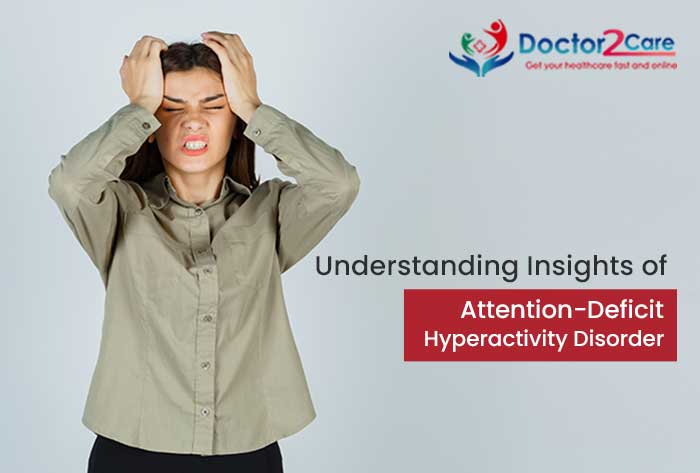Understanding Insights of Attention-Deficit Hyperactivity Disorder

Attention Deficit Hyperactivity Disorder, commonly known as ADHD is a condition that makes individuals forgetful and restless.
In our country, people have become aware of ADHD, leading to the need for effective treatment options. Where the healthcare landscape is rapidly evolving, the availability of medical services have become critical in ensuring the well-being of its vast population.
With the advent of technology, seeking professional support through online doctor consultation in India has become a convenient solution. But first we will help you understand and explore the aspects of ADHD so that you know when to seek a doctor and who might be of great help.
What is ADHD?
Attention-Deficit Hyperactivity Disorder (ADHD) is a condition that makes it hard for some people to pay attention, focus, control their impulses, and stay still. It mainly affects children but can continue into adulthood and causes them to be very restless.
Types of ADHD
ADHD is broadly classified into three subtypes based on the symptoms:
- Inattentive type: Individuals with this subtype struggle primarily with attention and focus. They find it difficult to follow instructions, organise tasks, and often seem forgetful.
- Hyperactive-impulsive type: This subtype is characterised by excessive physical restlessness, impulsivity, and difficulty in controlling impulses. These individuals may interrupt others and find it hard to wait for their turn.
Symptoms of ADHD
- Inattention: Struggling to pay attention to details, making careless mistakes, difficulty in sustaining attention on tasks, being easily distracted, and forgetfulness.
- Hyperactivity: Fidgeting or squirming, inability to stay seated, running or climbing excessively, feeling restless, and difficulty engaging in quiet activities.
- Impulsivity: Acting without thinking, interrupting conversations, difficulty in waiting for one's turn, and impatience.

Causes of ADHD
The exact cause of ADHD is not fully understood, but research suggests a combination of certain factors such as:
- Genetics: ADHD runs in families, indicating a strong genetic component.
- Brain Chemistry and Structure: Neurotransmitters like dopamine and norepinephrine, which are involved in regulating attention and impulsivity, may be imbalanced in individuals with ADHD.
- Environmental Factors: Exposure to toxins during pregnancy, premature birth, low birth weight, and maternal smoking can contribute to ADHD.
Diagnosis of ADHD
There is no single test for ADHD, so diagnosis is based on an individual's medical history, behaviour, and overall performance. A doctor or mental health professional will typically ask questions about the person’s symptoms and observe their behaviour.
Treatment of ADHD
There is no cure for ADHD, but there are effective treatments that can help manage the symptoms.
- Medication: Medications, such as stimulant drugs, can help improve attention and focus. However, it is important to talk to your doctor before starting treatment.
- Therapy: There are many different types of therapy, including cognitive-behavioural therapy (CBT), behavioural therapy, and family therapy to help them learn and manage symptoms.
- Lifestyle changes: There are also some lifestyle changes that can help manage ADHD symptoms like getting enough sleep, eating a healthy diet, and exercising regularly.
Wrapping Up
ADHD is a complex disorder that affects millions of people worldwide. With support from online doctor consultation in India, individuals with ADHD can learn to navigate their challenges and capitalise on their strengths.